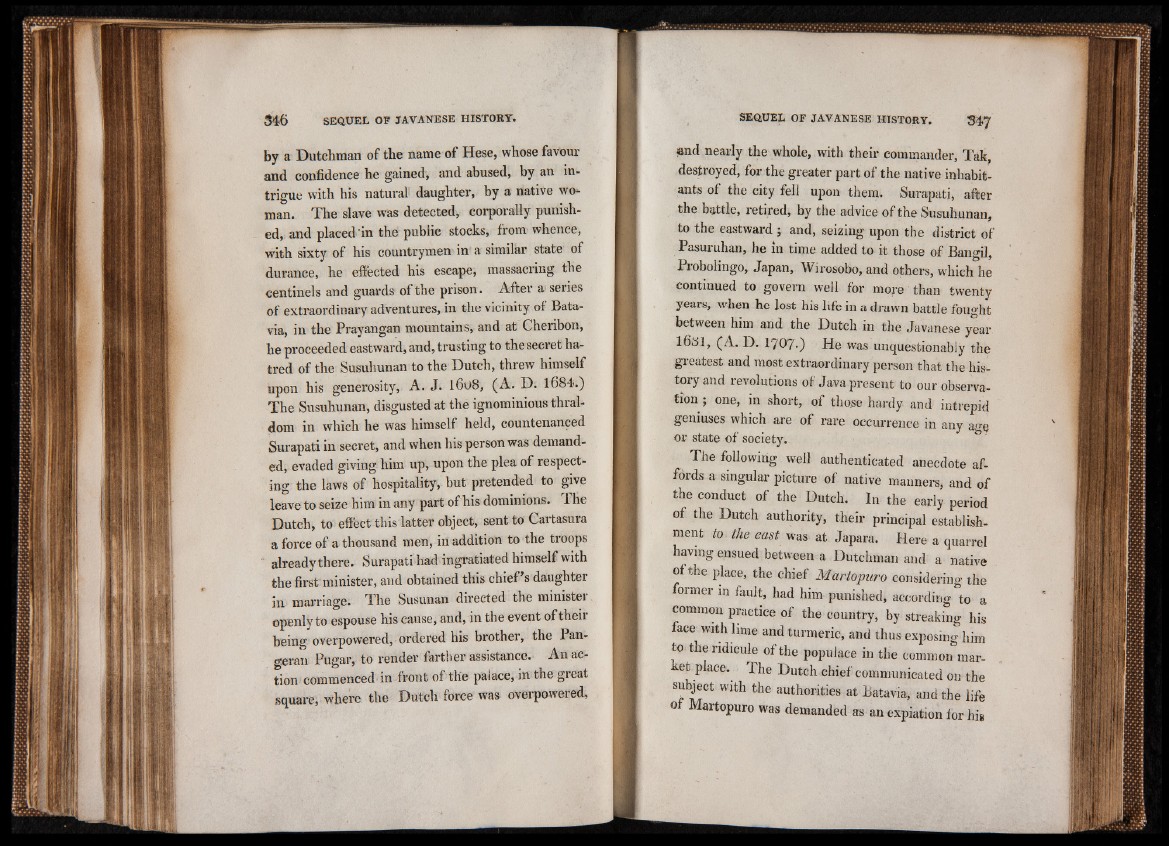
by a Dutchman of the name of Hese, whose favour
and confidence he gained, and abused, by an in*
trigUe with his natural daughter, by a native wo-
man. The slave was detected, corporally punishe
d , a n d placed in the public stocks, from whence,
with sixty of his countrymen in a similar state of
durance, he effected his escape, massacring the
centinels and guards of the prison . After a1 series
of extraordinary adventures, in the vicinity of Batavia,
in the Prayangan mountains, and at Cheribon,
he proceeded eastward, and, trusting to the seci et hatred
of the Susuhunan to the Dutch, threw himself
upon his generosity, A. J. I6u8, (A. D; 1684.)
The Susuhunan, disgusted at the ignominious thraldom
in which he was himself held, countenanced
Surapati m secret, and when his person was demanded,
evaded giving him up, upon the plea of respecting
the laws of hospitality, but pretended to give
leave to seize him in any part of his dominions. The
Dutch, to effect this latter object, sent to Cartasura
a force of a thousand men, in addition to the troops
already there. Surapati had ingratiated himself with
the first minister, and obtained this chief’s daughter
in marriage. The Susunan directed the ministei
openly to espouse his cause, and, in the event of their
being overpowered, ■ordered his brother, the Pan-
geran Pugar, to render farther assistance. An action
commenced in front of the paiace, in the great
square, where the Dutch force was overpowered,
and nearly the whole, with their commander, Tak,
destroyed, for the greater part of the native inhabitants
of the city fell upon them. Surapati, after
the battle, retired, by the advice of the Susuhunan,
to the eastward ; and, seizing upon the district of
Pasuruhan, he in time added to it those of Bangil,
Probolingo, Japan, Wirosobo, and others, which he
continued to govern well for more than twenty
years, when he lost his life in a drawn battle fought
between him and the Dutch in the Javanese year
1631, (A. D. I707.) He was unquestionably the
greatest and most extraordinary person that the history
and revolutions of Java present to our observation
; one, in short, of tho.se hardy and intrepid
geniuses which are of rare occurrence in any ago
or state of society.
The following well authenticated anecdote affords
a singular picture of native manners, and of
the conduct of the Dutch. In the early period
of the Dutch authority, their principal establishment
to the east was at Japara. Here a quarrel
having ensued between a Dutchman and a native
of the place, the chief Martopuro considering the
former in fault, had him punished, according to a
common practice of the country, by streaking his
face with lime and turmeric, and thus exposing him
to the ridicule of the populace in the common market
place. The Dutch chief communicated 011 the
subject with the authorities at Batavia, and the life
of Martopuro was demanded as an expiation for his